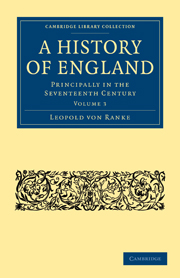Book contents
- Frontmatter
- Contents
- BOOK XI THE COMMONWEALTH IN ENGLAND, 1649—1653
- BOOK XII THE PROTECTORATE OF OLIVER CROMWELL, 1653–1658
- CHAP. I Oliver Cromwell and his elevation to the Protectorate
- CHAP. II Embassy to Sweden. Peace with Holland
- CHAP. III The Parliament of 1654
- CHAP. IV Military government. Religious tolerance
- CHAP. V Rupture with Spain
- CHAP. VI The Parliament of 1656, 1657. Idea of a Cromwellian Monarchy
- CHAP. VII The general position of the Protectorate at home and abroad in 1657 and 1658
- CHAP. VIII Death of Oliver Cromwell
- BOOK XIII FALL OF THE PROTECTORATE AND THE COMMONWEALTH. RESTORATION OF THE MONARCHY, 1658—1660
- BOOK XIV THE FIRST FIVE YEARS UNDER CHARLES II. THE RESTORATION OF THE ANGLICAN CHURCH
- BOOK XV THE DUTCH WARS OF CHARLES II. ESTABLISHMENT OF THE PROTESTANT AND PARLIAMENTARY CHARACTER OF THE CONSTITUTION 1664—1674
CHAP. VII - The general position of the Protectorate at home and abroad in 1657 and 1658
Published online by Cambridge University Press: 07 June 2011
- Frontmatter
- Contents
- BOOK XI THE COMMONWEALTH IN ENGLAND, 1649—1653
- BOOK XII THE PROTECTORATE OF OLIVER CROMWELL, 1653–1658
- CHAP. I Oliver Cromwell and his elevation to the Protectorate
- CHAP. II Embassy to Sweden. Peace with Holland
- CHAP. III The Parliament of 1654
- CHAP. IV Military government. Religious tolerance
- CHAP. V Rupture with Spain
- CHAP. VI The Parliament of 1656, 1657. Idea of a Cromwellian Monarchy
- CHAP. VII The general position of the Protectorate at home and abroad in 1657 and 1658
- CHAP. VIII Death of Oliver Cromwell
- BOOK XIII FALL OF THE PROTECTORATE AND THE COMMONWEALTH. RESTORATION OF THE MONARCHY, 1658—1660
- BOOK XIV THE FIRST FIVE YEARS UNDER CHARLES II. THE RESTORATION OF THE ANGLICAN CHURCH
- BOOK XV THE DUTCH WARS OF CHARLES II. ESTABLISHMENT OF THE PROTESTANT AND PARLIAMENTARY CHARACTER OF THE CONSTITUTION 1664—1674
Summary
Alliance with France and Sweden.
The close of the session was enlivened, as the beginning had been, by the news of a great victory over the Spaniards. It ranks among Blake's most wonderful achievements that on April 20, 1657, he attacked and destroyed the Spanish fleet from the West Indies, as it lay in the harbour of Santa Cruz at Teneriffe, protected by the castle and a chain of forts: sixteen galleons and other vessels, with a large portion of the American goods which they had on board, were lost. Only the silver and jewels were safely carried on shore. The news reached London at the end of May. It could not fail to strengthen the public confidence in the Protector and in his lucky star.
The same fleet had already on a previous occasion performed a service of great political importance. It had put an end to the delays of the Portuguese in ratifying the commercial treaty which was now ready prepared. There too the clergy and the court were indignant because the treaty secured religious liberty to English sailors and merchants contrary to the usages of the country. When Blake and Montague appeared off the coast, they offered the Portuguese the choice of either using their fleet, the best manned and the best equipped then afloat, against the Spaniards their common enemies, or on the other hand of being themselves attacked by it.
- Type
- Chapter
- Information
- A History of EnglandPrincipally in the Seventeenth Century, pp. 185 - 203Publisher: Cambridge University PressPrint publication year: 2010First published in: 1875

